| |
- 1865 - 1869
- 1865 Ordinance to Stop Burials and Establish a Public Park
- 1865 Ordinance for City Charter
- 1866 Intramural Interments Reference
- 1866 Ordinance Prohibiting Interments
- 1866 A Woman's Plea
- 1867 Costs for Removing 1,635 Bodies
- 1868 Lot Owners' Offer and Rejection
- 1869 Plea to Donate Lots
Chicago Tribune, April 17, 1865
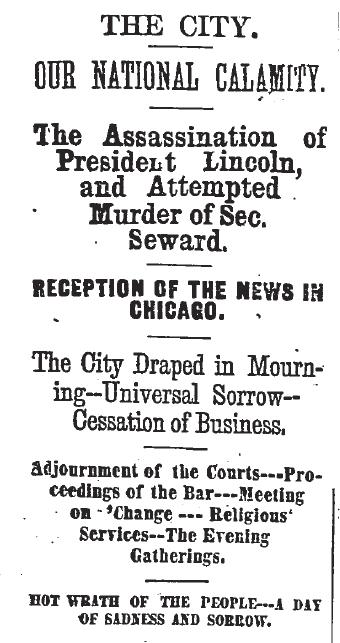
|
In April 1865, the month Abraham Lincoln was assassinated, the northern 60 acres of the city-owned land abutting the edge of the City Cemetery was called Lake Park. Replacing the earlier, generically- named Cemetery Park, the equally descriptive Lake Park was the second lakeshore-based park to have that name. The other Lake Park was located on the land now occupied by the Chicago Cultural Center, across the street from today's Millenium Park. On June 12, 1865, on account of there being two Lake Parks in Chicago, Lincoln Park was named to honor the recently slain President. (See the order to name Lincoln Park, here.)
In 1863 an attorney representing the Jacob Milliman estate approached the city government with the news that the City had illegally acquired Block 49 in 1850. As mentioned in the 1850 - 1854 section, Jacob Milliman's farm once occupied those grounds. The legal action on behalf of the Milliman heirs went all the way to the State Supreme Court, that ruled that the City never properly acquired the title to the 12- acre parcel of land. As a result, the City was required to vacate the grounds and return the land to the Milliman family. The land had been surveyed and sold as deeded lots within the City Cemetery. By the time of the law suit, all parts of this land had been sold. The acreage contained six hundred fifty six (656) lots. Each lot, measuring 9 x 24 feet, if filled, could contain eight bodies. (See the complete Milliman Tract story in the Milliman Tract section within the Contributing Factors in Moving the Cemetery section.)
In 1866, in addition to the ongoing legal arguments and the first surge of disinterments from the Milliman Tract section of the cemetery, Dr. John H. Rauch's pamphlet, "Intramural Interments in Populous Cities" was published. The City now had another pressing concern regarding the ongoing burials in the City Cemetery - public health. Rauch's writings had more to do with the need to stop burials than to move the cemetery. The 1859 ordinance relating to stopping burials was only in relation to the sale of additional lots. Families who already owned lots in the City Cemetery were allowed to continue burials. Also, the potter's field along the eastern edge of the cemetery was in continual use.
In 1869, with the establishment of the Lincoln Park Act, the Lincoln Park Commissioners assumed control and responsibility for the old cemetery grounds.
|
This document begins with a reiteration of the ordinance for which a special meeting of the Common Council was held nearly an entire year earlier (detailed here.) It continues with the acknowledgement that despite the order to halt burials except in existing family lots and the city's potter's field, there had been 1,640 interments in the 1865.
Burials continued through March 1866.
Scroll to the Right --->> |
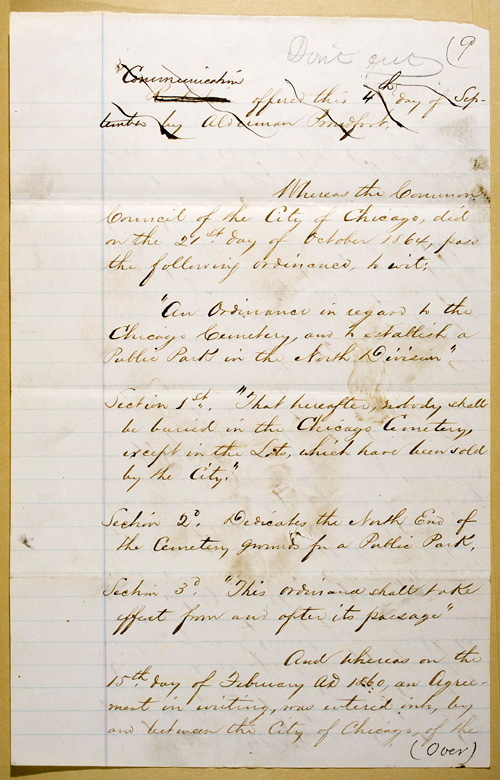
All documents on this page, courtesy of the Illinois Regional Archives Depository.
|
Whereas the Common Council of the City of Chicago, did on the 21st day of October 1864, pass the following ordinance, to wit:
“An Ordinance in regard to the Chicago Cemetery, and to establish a Public Park in the North Division.”
Section 1st “That hereafter, nobody shall be buried in the Chicago Cemetery, except in the Lots, which have been sold by the City.”
Section 2d Dedicates the North End of the Cemetery grounds for a Public Park,
Section 3d “This ordinance shall take effect from and after its passage”
And whereas on the 15th day of February AD 1860, an Agreement in writing, was entered into, by and between the City of Chicago, of the
|
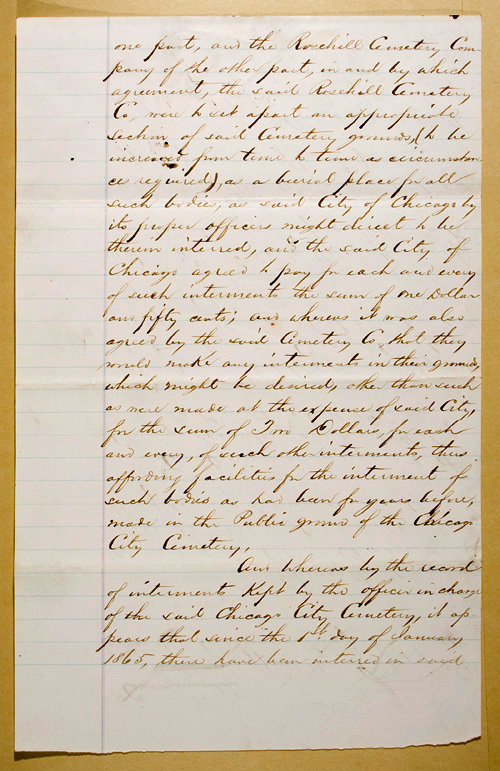 |
one part, and the Rosehill Cemetery Company of the other part, in and by which agreement, the said Rosehill Cemetery Co., were to set apart an appropriate section of said Cemetery grounds, (to be increased from time to time as circumstances required), as a burial place for all such bodies, as said City of Chicago by its proper officers might direct to be therein interred, and the said City of Chicago agreed to pay for each and every of such interments the sum of One Dollar and fifty cents; and whereas it was also agreed by the said Cemetery Co, that they would make any interments in their grounds, which might be desired, other than such as were made at the expense of said city, for the sum of Two Dollars, for each and every, of such other interments, thus affording facilities for the interment of such bodies as has been for years before, made in the Public ground of the Chicago City Cemetery.
And whereas by the record of interments kept by the officer in charge of the said Chicago City Cemetery, it appears that since the 1st day of January 1865, there have been interred in said |
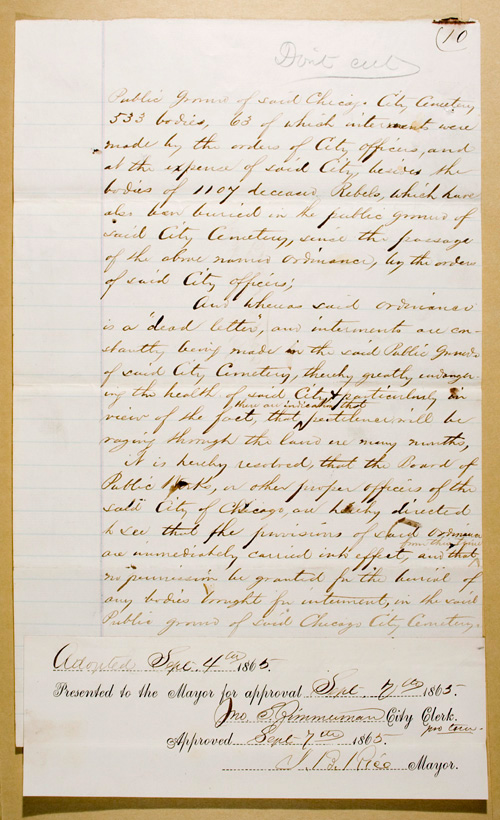 |
Public Grounds of said Chicago City Cemetery 533 bodies, 63 of which interments were made by the orders of city officers, and at the expense of said City, besides the bodies of 1107 deceased Rebels, which have also been buried in the public ground of said City Cemetery, since the passage of the above named ordinance, by the orders of said City officers;
And whereas said ordinance is a “dead letter”, and interments are constantly being made in the said Public Grounds of said City Cemetery, thereby greatly endangering the health of said City and particularly in view of the fact, that there are indications that pestilence will be raging through the land ere many months,
it is hereby resolved, that the Board of Public Works, or other proper officers of the said City of Chicago, are hereby directed to see that the provisions of said ordinances are immediately carried into effect, from this time and that no permission be granted for the burial of any bodies brought for interment, in the said Public ground of said Chicago City Cemetery.
Adopted Sept. 4th 1865
Presented to the Mayor for approval Sept. 7th 1865.
Jno. S. Zimmerman City Clerk.
Approved Sept. 7th 1865
J.B. Rice Mayor. |
The Common Council wrote several ordinances relative to prohibiting further burials in the City Cemetery. This ordinance, published in Chapter VI of the new City Charter, was written in 1865.
Section 1. Hereafter no body shall be buried in all that part of the south-east quarter of the south-east quarter of section thirty-three, township forty north, range fourteen east of the third principal meridian, (excepting therefore four acres, not the property of the city,) and blocks numbered 50, 49, 48, 36, 35, 34, 33, 18 and 17, in said section as the same are numbered on the plat of the survey of the canal trustees, heretofore set apart for the burial of the dead, and known and distinguished as the “Chicago Cemetery”, except in the lots which have been sold by the city. All of the north part of said tract which has not been surveyed and divided into cemetery lots, consisting of blocks 17, 18, 33 and 34, and the north part of blocks 35 and 36, is hereby set apart in and declared to be a public park, and shall be known by the name of “Lincoln Park.”
Sec. 2. All moneys hitherto arising from the sale of lots therein, shall be kept a distinct fund, and be exclusively expended in adding to or ornamenting and improving the cemetery grounds not set apart above as a park, and the board of public works are hereby authorized and empowered to take such steps as they may deem proper for the improvement of the cemetery grounds, and to improve the walks and drains, or ditches, connected therewith, in such manner as they may deem most conducive to public convenience, and the proper preservation of the same; and for the payment of all such expenses, they shall certify their approval of the same to the comptroller, who shall pay the same by draft on the treasurer, payable out of the cemetery fund.
Sec. 3. The Board of Public Works shall keep a record, in which shall be recorded the number of every lot heretofore sold in the cemetery, beginning with number one, with columns ruled therein for the name of the purchaser, the appraisal, price sold for, and date of sale; and the treasurer shall keep a cemetery account, in which all moneys received or paid on account of the cemetery, shall be entered.
Sec. 4. If any person shall bury or attempt to bury any dead body in any unsold lot, or in any lot belonging to another, without permission in writing; or be found discharging firearms, hunting or trespassing in any other matter in the cemetery; or shall injure, deface or destroy any tree, shrub, stone, stake, post, fence, monument, vault or other fixture, building or thing of value or ornament in the cemetery, or trespass on any grave in the cemetery, he or they shall severally be subjected to a fine not less than ten dollars nor exceeding five hundred dollars; and the court or magistrate may, in any aggravated case, cause the offender to be imprisoned for a period not exceeding six months, in addition to the fine.
|
In this document, the legal counsel to the city is giving his opinion on the city's authority to prohibit further burials in the City Cemetery. The words, "intramural interments" refer to burials within city limits, a practice that was challenged for its sanitary risks of having the dead in close proximity to the living population.
During this time, as a result of litigation, the City was also dealing with the removal of the dead from the Milliman Tract.
______________________________
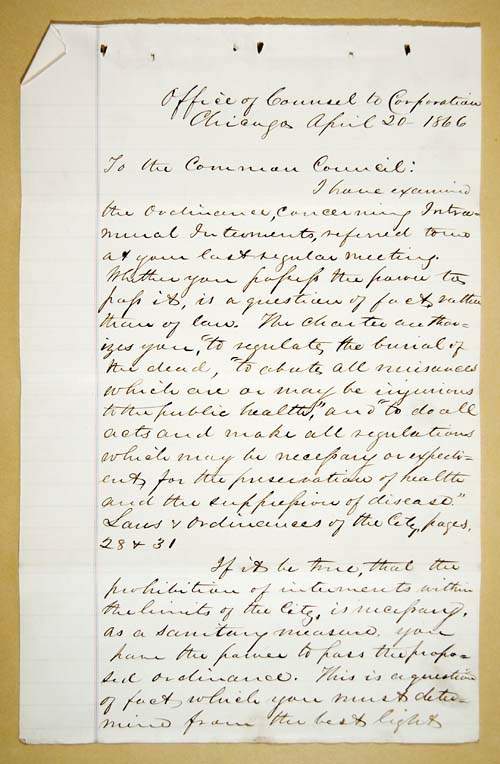 |
This is the plea to which City Attorney Irvin is responding. --->>
The Ordinance itself is in the Tab, above.
Office of the Counsel to Corporation
Chicago April 20 – 1866
To the Common Council:
I have examined the Ordinance, concerning Intramural Interments, referred to me at your last regular meeting.
Whether you possess the power to pass it, is a question of fact, rather than of law. The charter authorizes you, “to regulate the burial of the dead, “to abate all nuisances which are or may be injurious to the public health,” and “to do all acts and make all regulations which may be necessary or expediant for the preservation of health and the suppression of disease.” Laws & Ordinances of the City, pages, 28 & 31.
If it be true, that the prohibition of interments within the limits of the City, is necessary, as a sanitary measure, you have the power to pass the proposed ordinance. This is a question of fact which you must determine from the best light within your reach.
All of which is respectfully submitted. S.A. Irvin
Council to Corporation |
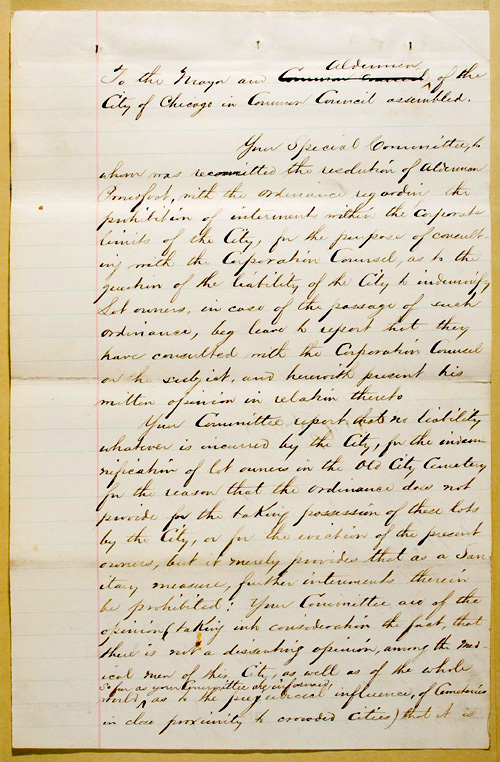
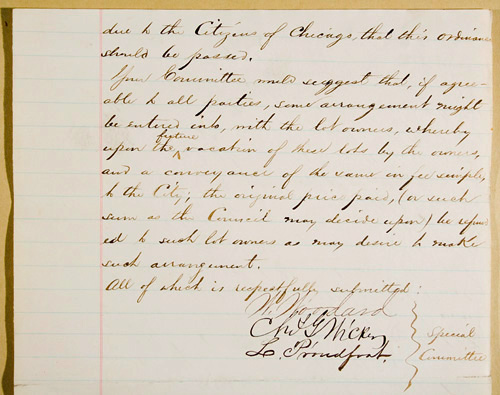 |
To the Mayor and Aldermen of the City of Chicago in Common Council assembled.
Your Special Committee, to whom was recommitted the resolution of Alderman Proudfoot, with the ordinance regarding the prohibition of interments within the Corporate limits of the City, for the purpose of consulting with the Corporation Counsel, as to the question of the liability of the City to indemnify Lot owners, in case of the passage of such ordinance, beg leave to report that they have consulted with the Corporation Counsel on the subject, and herewith present his written opinion in relation thereto
Your Committee report, that no liability whatever is incurred by the City, for the indemnification of lot owners in the Old City Cemetery for the reason that the ordinance does not provide for the taking possession of these lots by the City, or for the eviction of the present owners, but it merely provides that as a Sanitary measure, further interments therein be prohibited: Your Committee are of the opinion (taking into consideration the fact, that there is not a dissenting opinion among the medical men of this City, as well as of the whole world so far as your Committee are informed, as to the prejudicial influence, of Cemeteries in close proximity to crowded cities) that it is due to the Citizens of Chicago, that this ordinance should be passed.
Your Committee would suggest that, if agreeable to all parties, some arrangement might be entered into, with the lot owners, whereby upon the future vacation of these lots by the owners, and a conveyance of the same in fee simple, to the City; the original price paid, (or such sum as the Council may decide upon) be refunded to such lot owners as may desire to make such arrangement.
All of which is respectfully submitted:
W.Woodard
Chas G. Wicker
L. Proudfoot
Special Committee |
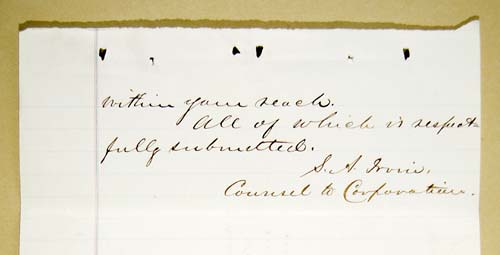
All documents on this page, courtesy of the Illinois Regional Archives Depository.
|
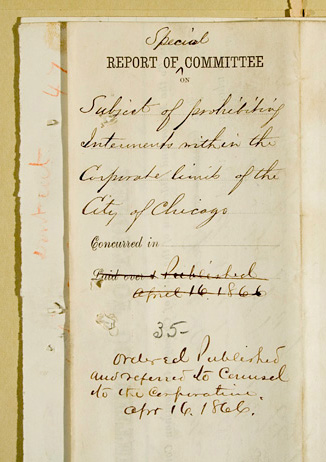
Whereas the City is rapidly extending around and beyond the old City and Catholic Cemeteries in the North Division, and whereas the continuance of the custom of interments in these Cemeteries, cannot fail to be prejudicial to the health of the vicinity, as well as to the general health of the City of Chicago, therefore as a Sanitary measure
Section 1 Be it ordained by the Common Council of the City of Chicago: That hereafter no body shall be buried in either the City, or Catholic Cemeteries in the North Division, nor within the Corporate limits of the City of Chicago.
Section 2 Any person who shall violate the provisions of this ordinance shall be liable to a fine of $250.00 for each and every such violation.
Section 3 All ordinances or part of ordinances heretofore passed which may be in conflict with this ordinance, are hereby repealed.
Section 4 This ordinance shall be in full force and effect from and after its passage, and due publication.
|
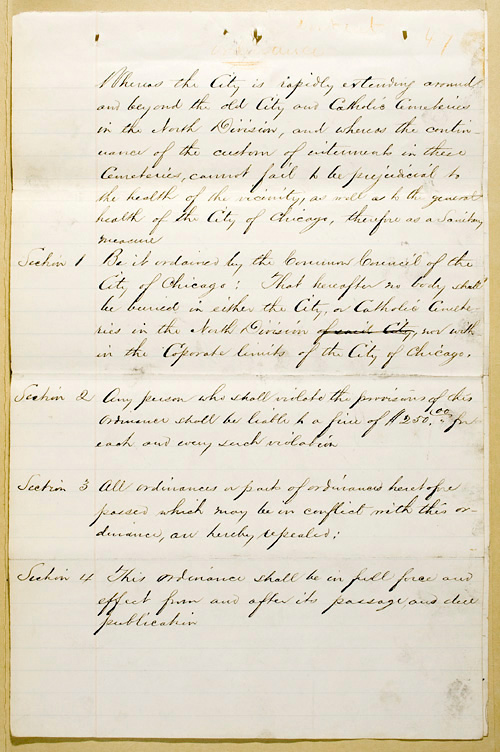
Both documents on this page, courtesy of the Illinois Regional Archives Depository.
|
In 1866, Isabelle Huth, a widow whose deceased husband, sister, and child were buried in the City Cemetery's Milliman Tract, made an unsuccessful plea to the Board of Public Works for the city to pay for the disinterment of three family members and the cost of a similarly sized lot in Graceland Cemetery.
The Commissioners of the Board of Public Works supported her plea and submitted it on her behalf to the Common Council.
Scroll to the Right ------>> |
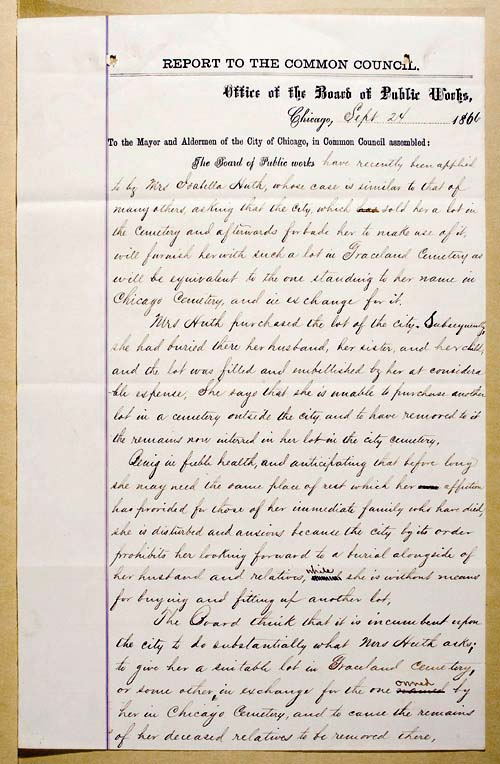
All documents on this page, courtesy of the Illinois Regional Archives Depository.
|
REPORT TO THE COMMON COUNCIL
Office of the Board of Public Works,
Chicago, Sept 24 1866
To the Mayor and Aldermen of the City of Chicago, in Common Council assembled:
The Board of Public works have recently been applied to by Mrs. Isabella Huth, whose case is similar to that of many others, asking that the city, which sold her a lot in the Cemetery and afterwards forbade her to make use of it, will furnish her with such a lot in Graceland Cemetery as will be equivalent to the one standing to her name in Chicago Cemetery, and in exchange for it.
Mrs. Huth purchased the lot of the city. Subsequently, she had buried there her husband, her sister, and her child, and the lot was filled and embellished by her at considerable expense. She says that she is unable to purchase another lot in a cemetery outside the city, and to have removed to it the remains now interred in her lot in the city cemetery.
Being in feeble health, and anticipating that before long she may need the same place of rest which her affection has provided for those of her immediate family who have died, she is disturbed and anxious because the city by its order prohibits her looking forward to a burial alongside of her husband and relations, while she is without means for buying and fitting up another lot.
The Board think that it is incumbent upon the city to do substantially what Mrs. Huth asks; to give her a suitable lot in Graceland Cemetery, or some other, in exchange for the one owned by her in Chicago’s Cemetery, and to cause the remains of her deceased relations to be removed there. |
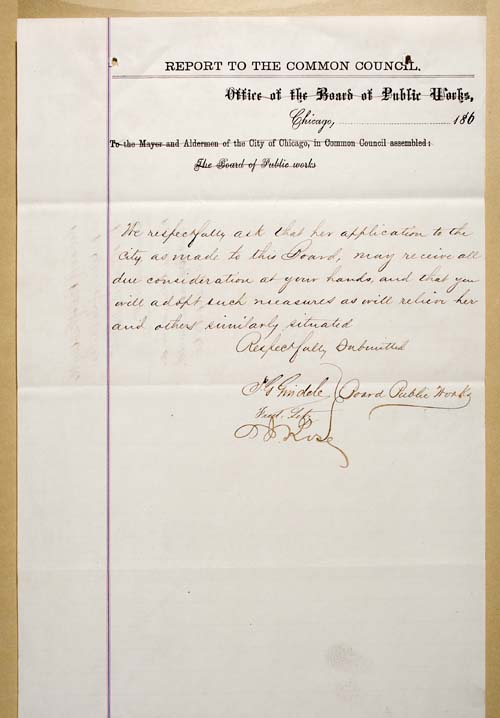 |
We respectfully ask that her application to the City as made to this Board, may receive all due consideration at your hands, and that you will adopt such measures as will relieve her and others similarly situated.
Respectfully Submitted
J.G. Gindele
Fred. Letz
O.J. Rose Board Public Works
************
|
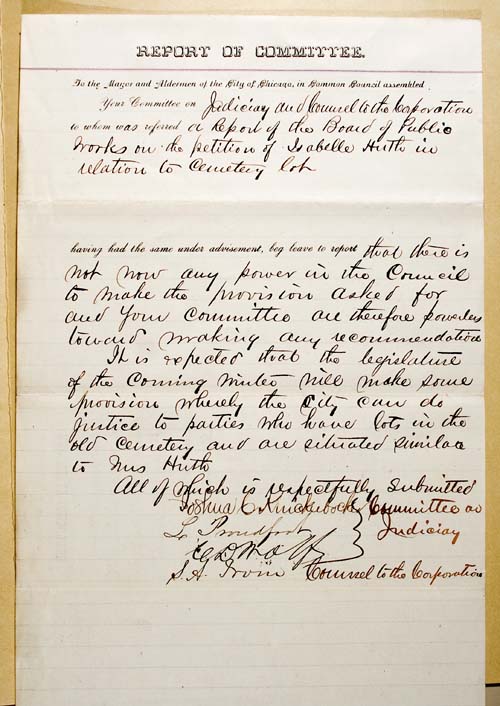 |
To the Mayor and Aldermen of the City of Chicago, in Common Council assembled: Your Committee on Judiciary and Counsel to the Corporation to whom was referred a Report of the Board of Public Works on the petition of Isabella Huth in relation to Cemetery lot
Having had the same under advisement, be leave to report that there is not now any power in the Council to make the provision asked for and your Committee are therefore powerless toward making any recommendation.
It is expected that the legislature of the coming winter will make some provision whereby the City can do justice to parties who have lots in the old cemetery and are situated similar to Mrs. Huth.
All of which is respectfully submitted
Joshua C. Knickerbocker
L. Proudfoot
C.DeWolfe Committee on Judiciary
S.A. Irvin Counsel to the Corporation |
During this complicated time of transition of the cemetery grounds, a central factor contributing to the ongoing disinterments was the need for the City to evacuate a 12-acre parcel of land called the Milliman Tract. See information about the Milliman Tract here.
_______________________
This statement of expenditures details the cost to the city for the removal of 1,635 bodies from the Milliman Tract to the new private cemeteries outside Chicago's then city limits. |
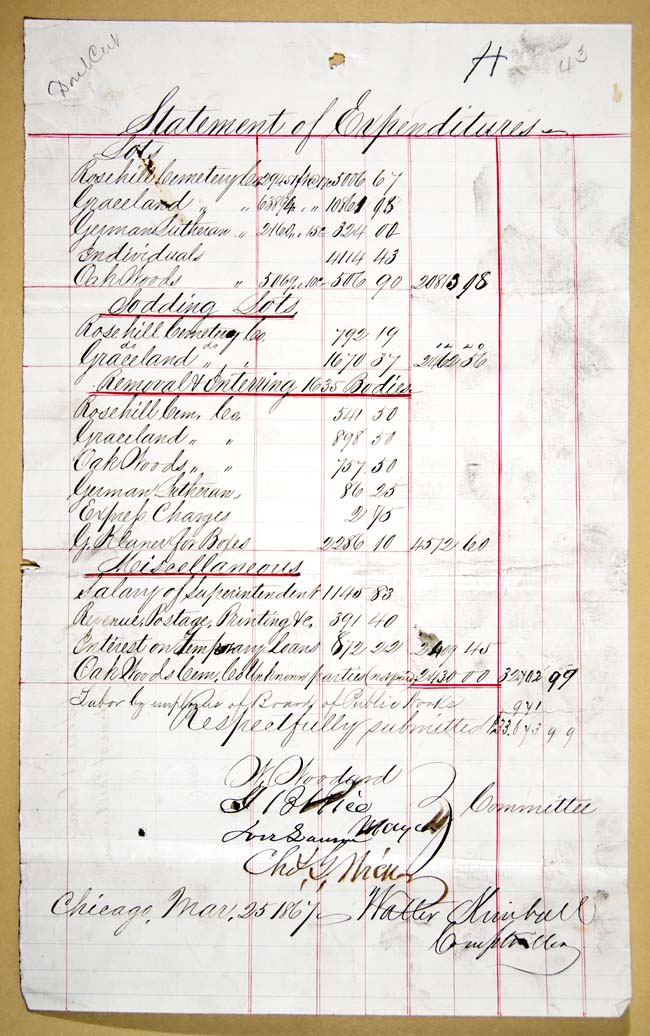
Courtesy of the Illinois Regional Archives Depository.
|
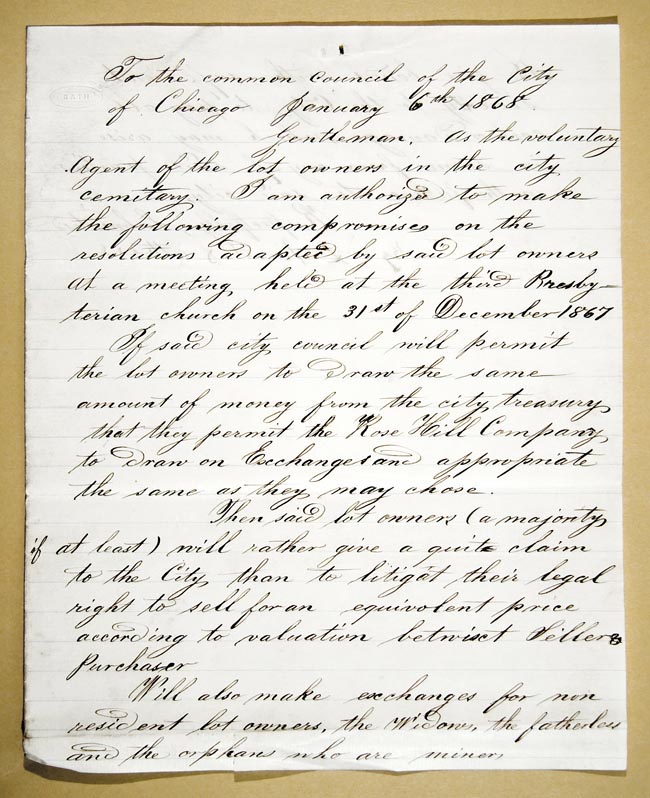
|
(copied verbatim)
To the common council of the City of Chicago
January 6th 1868
Gentleman, As the voluntary Agent of the lot owners in the city cemitary, I am authorized to make the following compromises on the resolutions adapted by the said lot owners at a meeting held at the third Presbyterian church on the 31st of December 1867.
If said city council will permit the lot owners to draw the same amount of money from the city treasury that they permit the Rose Hill Company to draw on Exchanges and appropriate the same as they may choose.
Then said lot owners (a majority if at least) will rather give a quit claim to the City than to litigate their legal right to sell for an equivalent price according to valuation betwixt Seller & Purchaser.
Will also make exchanges for non resident lot owners, the Widows, the fatherless and the orphans who are miners.
And give bonds with sufficient Security to the City, to pay all cost or Damage which may arise in same from any of said parties in the future of said city,
Respectfully submitted,
by L. Kent & Others |
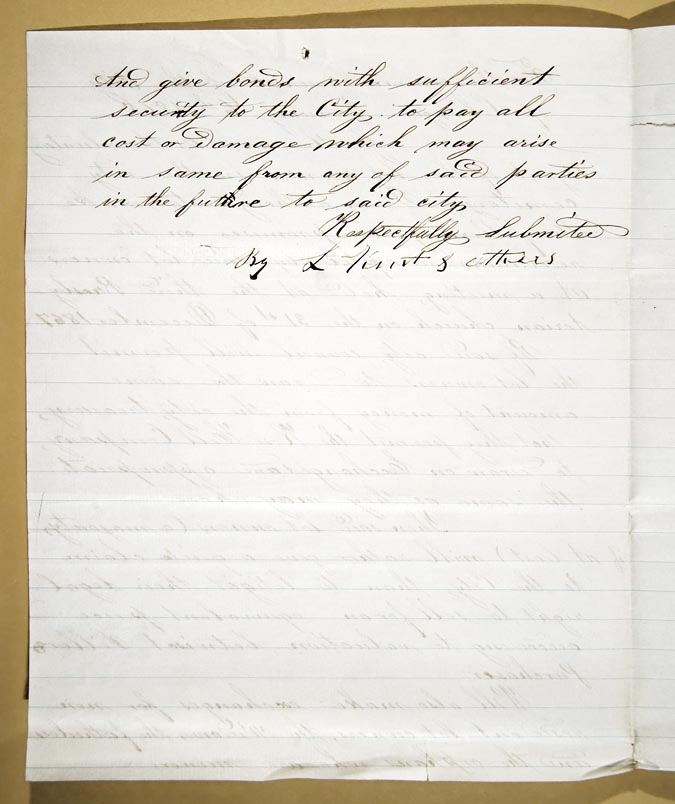
|
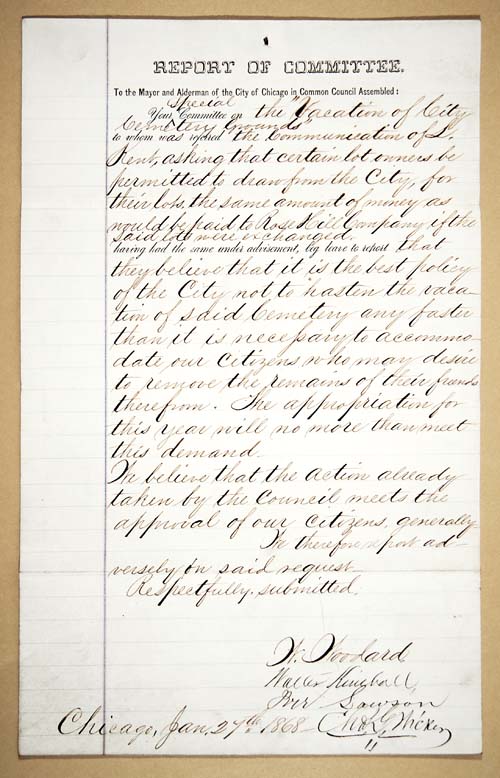
|
REPORT OF THE COMMITTEE
To the Mayor and Alderman of the City of Chicago in Common Council Assembled:
Your Special Committee on the “Vacation of City Cemetery Grounds” to whom was referred the Communication of L. Kent, asking that certain lot owners be permitted to draw from the City, for their lots, the same amount of money as would be paid to Rose Hill Company if the said lots were exchanged, having had the same under advisement, beg leave to report that they believe that it is the best policy of the City not to hasten the vacation of said Cemetery any faster than it is necessary to accommodate our Citizens who may desire to remove the remains of their friends therefrom. The appropriation for this year will no more than meet this demand.
We believe that the action already taken by the Council meets the approval of our Citizens, generally.
We therefore report adversely said request –
Respectfully submitted,
W. Woodard
Walter Kimball
Iver Lawson
Chas. Wicker
Chicago, Jan. 27th 1868 |
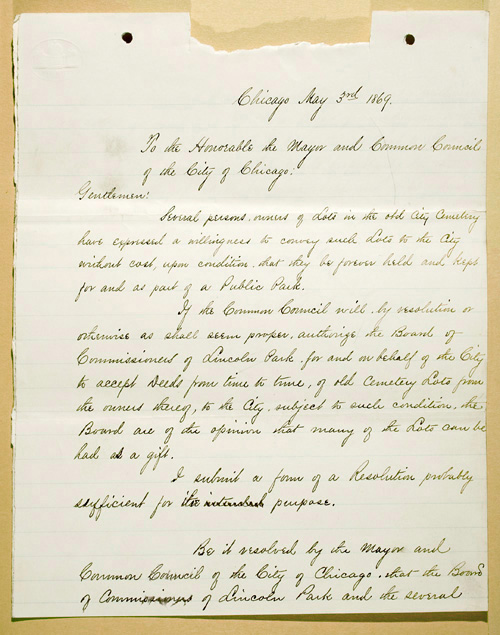
Both documents on this page, courtesy of the Illinois Regional Archives Depository.
|
This is a communication from a Lincoln Park Commissioner. The commissioners were given jurisdiction over the park and cemetery grounds in February 1869.
At this point, the Lincoln Park section begins to overlap with the City Cemetery section of this project.
___________________________
Chicago May 3rd 1869
To the Honorable the Mayor and Common Council of the City of Chicago;
Gentlemen:
Several persons, owners of Lots in the old City Cemetery have expressed a willingness to convey such Lots to the City without cost, upon condition that they be forever held and kept for and as part of a Public Park.
If the Common Council will by resolution or otherwise as shall seem proper, authorize the Board of Commissioners of Lincoln Park, for and on behalf of the City to accept Deeds from time to time, of old Cemetery Lots from the owners thereof, to the City, subject to such condition, the Board are of the opinion that many of the Lots can be had as a gift.
I submit a form of a Resolution probably sufficient for its purpose.
Be it resolved by the Mayor and Common Council of the City of Chicago, that the Board of Commissioners of Lincoln Park and the several individual members thereof be and they are hereby authorized to accept for the city of Chicago, deeds of conveyance to the City, of Lots in the old City Cemetery, subject to the condition to be inserted in such Deeds respectively that the Lots so conveyed shall be forever held and kept for as part of a Public Park.
Respectfully,
E.B. McCagg |
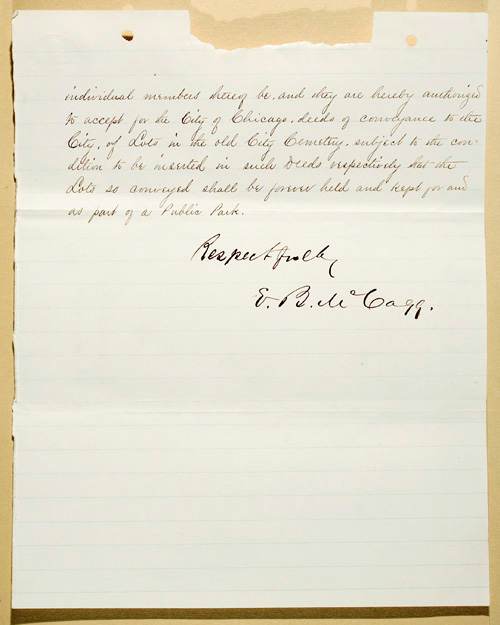 |
|